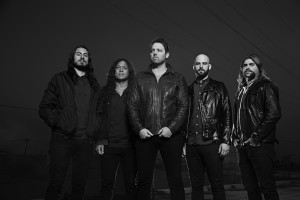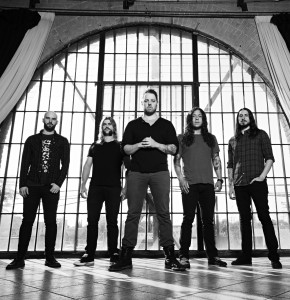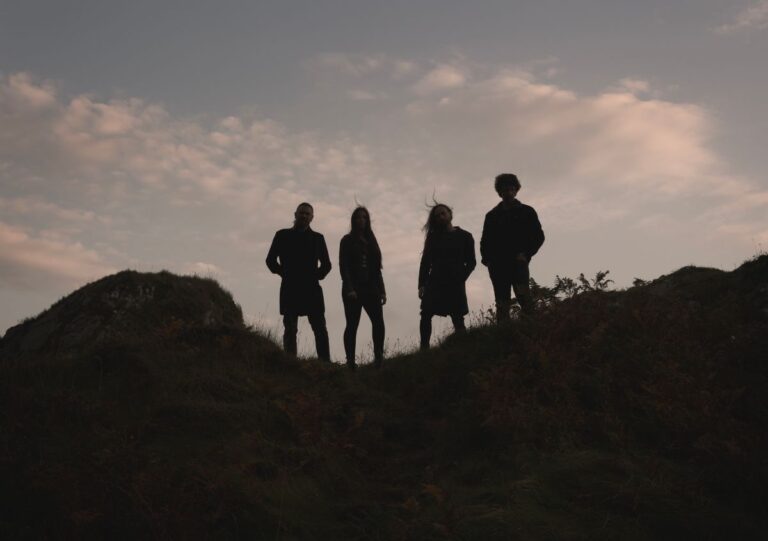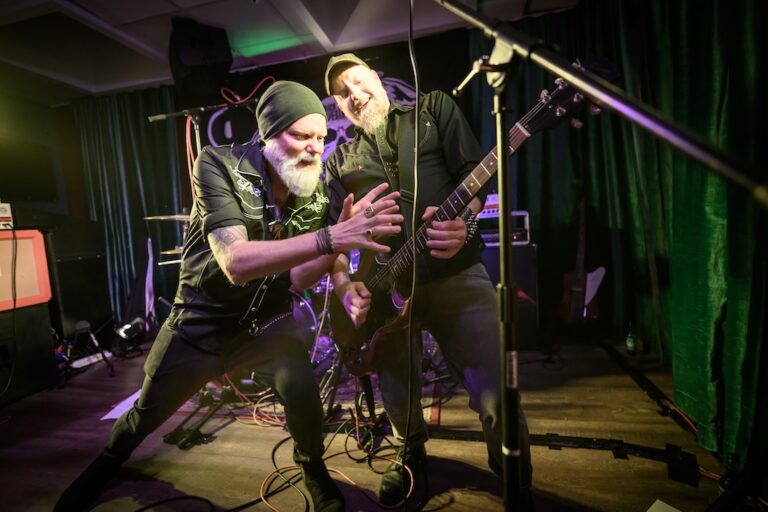There is a fair argument to be made that, even if we were to ignore the press scrutiny surrounding the former members of As I lay Dying, Wovenwar’s debut album would be receiving plenty of attention for its strong melodic trappings and brave stylistic departure’s from the musicians’ previous incarnation. A fiery, riff driven beast, Wovenwar’s self-titled effort is a blistering reassertion of the skills of these four musicians whilst, in Shane Blay the band have found a singer of depth and power who perfectly augments their new found melodic bent. The result is an epic album of light and shade that, whilst still maintaining the powerful riffs and brutal percussive assault of As I Lay Dying, frequently opens up to reveal whole new melodic possibilities and it’s no surprise that the band are touring with the similarly inclined In Flames later in the year.
Of course Wovenwar did not form in a vacuum. The circumstances of the band’s formation are well documented, but even so it is quite impossible to forget that, as this album comes out, Tim Lambesis, erstwhile singer of As I Lay Dying, remains behind bars as a result of one of the most surprising trials in recent history. It must have been appalling for the band to see a person they thought they knew well fall apart so spectacularly and the charges levelled against him (of conspiring to kill his estranged wife) must have seemed as preposterous to his band mates as they did to fans at large when they were first announced. Now, with the truth out and the troubled singer jailed for six years, Wovenwar has become the only focus for these musicians and yet, far from sounding jaded or beaten down, the album is alive with hope. SonicAbuse were lucky enough to secure interview time with the band’s easy going and friendly bassist, Josh Gilbert, with whom we discussed the formation of the band, the role of religion in Wovenwar, the band’s work with long-time collaborator Colin Richardson and much more.
Read on and discover… WOVENWAR!
Wovenwar formed in 2013 as a supergroup type thing rather than a full-time project, is that right?
I don’t think that was the intention – that we wanted to put together a ‘supergroup’ or something – we happened to be good friends with Shane and the four of us wanted to keep together, obviously, so when we were talking with Shane about the whole situation and he was kinda letting us know that Oh Sleeper would be kind of going through that phase when a lot of the guys were getting married or wanting to tour less, so it would be a good time for us to do something. I don’t think we consider ourselves to be a ‘supergroup’ necessarily, we’re just stoked to have a bunch of (hopefully) good musicians just getting together and playing, you know?
Obviously things turned out quite differently to what you planned, and a lot of musicians in your position would have simply folded or carried on doing the same thing, but you’ve taken a really brave move and expanded your sound in a lot of different ways.
Yeah – I think we’ve always wanted to take our sound in different directions, but every band, I think, has boundaries. Not necessarily self-imposed but in As I Lay Dying we didn’t want to release a song with absolutely zero screaming because our singer was totally, you know, he couldn’t really sing, he was a screamer, so we couldn’t really experiment with taking it completely melodic on the vocal side and I think that that’s something we wanted to do and were finally able to do. But it wasn’t something we set out to do either, we just started writing with Shane and that was what came out organically from the writing process.
Two songs for me really stand out – ‘father son’ and ‘prophets’ – those songs really expanded your boundaries and were really brave…
Oh, I appreciate that man, yeah, we’re really proud of those two songs and we really wanted to have that dimension to the record. We thought it would be cool to kinda have the record as a ride with ups and downs and that was something that we were able to do with this record that we couldn’t do before.
What sort of influence do you think Shane had on you musically?
Well, the way it all came together was that the guys and I, about a month or so after we made the call to keep writing music together, we had a handful of very rough demos and it was sort of tough for us to officially decide in what direction we were going to go. Once we got the idea that maybe Shane would be a good fit, we sent him some demos and then saw what he gravitated towards naturally. Then, when he was able to come out to us and write and record some demos with me, vocally, we kind of realised – these sorts of songs are what are sounding really good and not forced for this group of people and we sort of, just took it day by day. And I wanna say that there were maybe thirty demos written, but we were kind of finding our own voice as we went and I would say three quarters of the first batch of songs weren’t even used because once we got into the groove writing with Shane, we sort of started getting more of a direction as a band.
When it comes to lyrical themes is it all Shane or do you have a hand in developing lyrics for the band?
The majority is Shane, but on this record especially, I would say Nick was writing a lot of lyrics. Nick stepped up and helped a lot with lyrics and, you know, with the old band it was something that was very personal and very closed off with the lyrical writing process, but with this band we were able to collectively get together and Shane and I would write lyrics together and Nick would write lyrics on his own and come in with us. We wanted to make the best lyrics and the best songs possible, so we were able to hear the lyrics beforehand and just offer… it was just a more open process – we were able to collectively enhance the lyrics I think.
One of the things I noticed with the press release for the album was that it focuses on a philosophy of self-responsibility, rather than Christianity, which was a big part of your last band – has there been a shift away from that?
Well, you now, when we founded this band, I think everyone views their belief, whatever their beliefs are, as something that’s very personal. That was something that we wrestled with at the end of As I Lay Dying as in we didn’t consider ourselves an evangelical band, but there was still a religious tinge to lyrics so were we a Christian band or weren’t we. But ultimately, the way we view Wovenwar is that it’s for the music. We have our personal beliefs and that’s something that is personal to us and we have no agenda with the lyrics or with the message of Wovenwar other than just playing music and writing, hopefully, emotionally evocative lyrics and I think it’s something that we were wrestling with because a lot of the lyrics we were writing with As I lay Dying were taken in a spiritual manner whether or not they were intended that way or not and I think with this band it is easier just to say that we wrote the lyrics as a band and not as a Christian band and there’s no message other than what the song says.
Another aspect I enjoyed was that there were quite a lot of subtle atmospheric elements, is that something you all had a hand in?
Yeah well there were bits of that with our previous band but, like the other ways we were able to experiment with this record, it was something we were able to pursue a lot more. It started with Shane and Nick who were doing a project before Wovenwar and before everything ended with our last band and it was heavily using guitars and electronics and Shane was very good at programming stuff like that so with songs like ‘father son’ it was completely programmed by Shane and, actually all the guitar and lyrics were written by Shane, so he kind of bought that to us and it was a new dynamic that we had never experimented with. From there, we were able to touch on that in other parts of the record, so the intro is something that Phil programmed and it comes across as this kind of Hans Zimmer-esque epic intro and that was something that before we never… I won’t say we didn’t think we had the place to experiment… but with that style it was less inviting to experimentation I think.
Given the intense media speculation over everything that happened was there a point where you were worried about how Wovenwar would be accepted?
Yeah, I mean I wouldn’t say we were worried because we knew that what we were doing was exactly what we wanted to do and Metal Blade was behind us 100% and so it was really natural to us and it felt like all the pieces fell into place perfectly, so I won’t say that we were nervous about the reaction. But it was definitely a polarising moment for the band and I think there were a lot of people who looked up to Tim and I think it’s really easy to read an interview or something that Tim’s written or said, and maybe… Of course we all want to forgive Tim for what he did, and he wants to be forgiven, but it’s something that… it’s easy for a fan of our old band to take the situation and turn it into a ‘this guy Vs that guy’ sort of thing and it’s really not that. We… just hope that people are able to look past the drama of that situation and appreciate our album for what it is.
With the two singles you’ve released it seems there’s a very positive vibe about the band and Shane’s vocals in particular are awesome throughout…
Thank you very much. I certainly think that the two songs that have been released so far are on the more positive side of the record and there’s some lyrical – you’ve heard the record I think – there’s definitely some lyrical exploration around more cathartic topics, and I think it has a good mix of… if the lyrics go to a dark place, then another song will balance that out with more positive lyrics. I think that it’s not an overall positive or negative record, it’s just kind of all over the spectrum.
I have heard the record and really enjoyed it and listening to it I though it felt very hopeful, overall, and very confident and assured – that was my reading of it…
Yeah, definitely. Adding Shane to the equation was so… it added an injection of life into the four of us and we had this new dynamic and I think it was a very creatively explosive mix. We got there and within three months we had fifteen songs completely done with vocals and I think it was a whirlwind that never felt forced and there was never a moment when we stumped by a song, and it all just came out so quickly and effortlessly and I think that’s what came across in the songs. It was just o triumphant for us to be able to get into a room and just do what we do, and do it with no sort of.. I don’t know, there was definitely no writer’s block. I think that for all of us it was something that we needed at the time to take our mind off of what was going on with the course and I think that’s what added to the feeling of what you were talking about.
You chose to go with Colin Richardson, how was it working with him on this album?
Well he did the last three As I Lay Ding albums, so we’re very well acquainted with him. He stayed out with us on one of our records – he stayed in California with us – and we’ve all got to know him really, as well as Karl his assistant, and they always do such a great job, they’re so detail orientated and any issues with the mix, they address them immediately, so it’s always been a really cool dynamic with those guys and really easy and we kind of… we know what he wants out of us and we know what we want out of him by now so it’s pretty painless.
You have a UK tour coming up I think?
Yeah, we’re due in Reading and Leeds festival. We have a show in London at the barfly and I think that’s the extent of it. But we’re coming back, I think, in late September and November and we’re playing with In Flames. I don’t have those exact dates in front of me, but I know we’re going to be in the area again at some point.
Photo Credit – Ty Watkins






